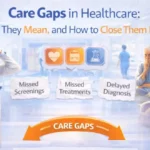Medicare Compliance and Reimbursement for Remote Care Programs

Remote healthcare is a technologically advanced and a competitive medical field where compliance matters at every step, whether it’s billing, insurance claims or reimbursements. To avoid penalties or reduced reimbursements, it is important to remain at the top of the compliance matters. For healthcare providers, service reimbursements using the right CPT codes is one of the primary sources of revenue generation and are applicable for all remote care programs.
According to the latest Centers for Medicare & Medicaid Services (CMS) fact sheet, healthcare costs are expected to rise from 17.7% of the economy in 2018 to 19.7% by 2028.
Remote care programs, including Remote Patient Monitoring (RPM), Chronic Care Management (CCM), Transitional Care Management (TCM), Principal Care Management (PCM), and Remote Therapeutic Monitoring (RTM) have become increasingly popular in delivering quality healthcare and care coordination, especially among the patients dealing with one or more chronic conditions.
Table of Contents
ToggleMedicare Compliance for Remote Care Programs
It is important for providers offering remote care services to adhere to Medicare compliance and the regulations set by the Centers for Medicare & Medicaid Services, or CMS, in order to guarantee that services are delivered and billed accurately.
- Eligibility & Documentation: To qualify for a remote care program, patients must have an acute or chronic condition that needs to be monitored regularly. Healthcare providers are required to confirm that these services are medically required and need to obtain the patients’ consent for remote monitoring. To maintain compliance and maximize reimbursements, it’s important to keep up to date documentation of the duration and frequency of the monitoring, as well as any clinical interventions made.
- Patient Consent: Before providing remote care services, Medicare needs patients to give their consent. The patient’s medical record needs to be documented with this consent. Patients are usually informed about what data would be gathered, how it will be used, and any associated expenses before giving their consent for any remote monitoring service.
- Privacy and Security: HIPAA, the Health Insurance Portability and Accountability Act, must be followed by remote care providers. This ensures that the patient data is protected from unwanted access and all kinds of communication and data transfer to any digital health platform is secure.
- Billing and Coding Requirements: For remote care services, CMS has formulated specific CPT codes, based on the requirements pertaining to the type of remote monitoring services delivered and the duration or time dedicated to patient care. In order to maximize reimbursements, providers must bill accurately using these codes.
Medicare Reimbursement for Remote Care Programs
In recent years, Medicare has significantly improved the coverage of remote care services for healthcare providers. By knowing how to bill for specific services and applying the right reimbursement, providers may optimize the long-term financial viability of their practice.
Medicare Part B provides reimbursement for RPM services based on a specific criteria. To qualify, healthcare providers must meet certain coding and documentation requirements that capture the complexity and duration of RPM services delivered. CPT Codes used in remote patient monitoring reimbursement include:
- CPT Code 99453: This code is used to bill for the initial setup and patient education associated with RPM services. It includes the time spent on initial device supply, instructions for proper use, and patient onboarding.
- CPT Code 99454: This code is used to bill for the supply and monitoring of a patient’s physiological data like blood pressure, weight, temperature, heart rate, blood-sugar. It includes the initial device supply, daily recording, data transmission, and patient-generated health data.
- CPT Code 99457: This code is used to bill for the initial 20 minutes of clinical staff time spent interactively communicating with the patient or caregiver to monitor RPM data, analyze outcomes, and make treatment interventions.
- CPT Code 99458: This code is an add-on code for CPT Code 99457, and it is used to bill for each extra 20 minutes of clinical staff time spent on interactive communication beyond the initial 20 minutes.
- Chronic Care Management (CCM)
CCM services are covered for patients with two or more chronic illnesses that are likely to last for at least a year. Medicare reimburses CCM for care coordination time in 20-minute increments along with comprehensive care planning, regular check-ins, and care coordination across different providers. Some CPT Codes used in chronic care management reimbursement include:
- CPT Code 99490: This code is used to bill for chronic care management services. It includes at least 20 minutes of clinical staff time per calendar month dedicated to care coordination, medication management, and communication with other healthcare providers involved in the patient’s care.
- CPT Code 99439: This is an add-on code for 99490. For every additional 20 minutes of clinical staff time guided by a physician or other qualified healthcare professional for chronic care management per month.
- CPT Code 99491: This code is billed by a physician or other qualified healthcare providers for personally offering CCM services to patients with various chronic conditions. It requires a detailed treatment plan and at least 30 minutes of CCM services per calendar month.
- CPT Code 99437: This add-on code for 99491 provides thorough care planning and monitoring for each additional 30 minute.
- CPT Code 99487: Initial complex chronic care management CPT code for patients with several chronic conditions that last at least a year. It comprises detailed care planning for chronic illnesses that require moderate to very complex medical decision making. The first 60 minutes of clinical staff time per month must be supervised by a physician or a qualified healthcare provider.
- CPT Code 99489: This is an add-on code for 99487. Every additional 30 minutes of clinical staff time each month must be supervised by a physician or a qualified healthcare provider.
- Transitional Care Management (TCM)
TCM services ensure successful transitioning of a patient from an in-patient facility to home/ community setting within 30-days of patient’s discharge. Healthcare providers need to be aware of the transitional care management billing requirements and ensure that all services provided are documented and billed using the right CPT codes. For accurate reimbursement, billing for TCM services requires a thorough understanding of the specified CPT codes associated with these services. Here are TCM CPT Codes for billing:
- CPT Code 99495: Medical practitioner’s communication (direct contact, telephone, electronic) with the patient and/or caregiver within 2 business days of discharge with medical decision making of at least moderate complexity during the service period. A compulsory face-to-face visit within 14 calendar days of discharge.
- CPT Code 99496: Medical practitioner’s communication (direct contact, telephone, electronic) with the patient and/or caregiver within 2 business days of discharge with medical decision making of high complexity. A compulsory face-to-face visit within 7 calendar days of discharge.
Principal Care Management is all about reimbursing physicians for the time they spent when caring for high risk chronically ill patients, including medication changes, creating a comprehensive care plan, patient follow-up and more. To maximize reimbursements, healthcare providers need to comply with the following CPT codes:
- CPT Code 99424: This code includes the first 30 minutes of PCM services per calendar month and is an extension of the services previously offered under G2064. Physicians, qualified healthcare providers, physician assistants, and nurse practitioners personally provide the care services and are eligible to bill under CPT Code 99424.
- CPT Code 99425: The code is an add-on code for 99424 for each additional 30 minutes of PCM services that a physician or qualified healthcare provider personally performs throughout a calendar month. This involves continuous adjustments as a part of the proactive care and medication management for patients.
- CPT Code 99426: This code covers first 30 minutes of PCM clinical staff time, as performed by clinical staff under the supervision and guidance of a physician or qualified healthcare provider.
- CPT Code 99427: This is an add-on code for 99426 for each additional 30 minutes of PCM clinical staff time, as performed by clinical staff and nurses under the supervision and guidance of a qualified healthcare provider.
When it comes to remote therapeutic monitoring reimbursements, there are six RTM codes, also known as general medicine codes that describes when and who is allowed to bill for it, including therapists, psychologists and pathologists. To maximize reimbursements, you need to comply with the following codes:
- CPT Code 98975: This code involves initial setup and patient education on use of equipment and billed only once at the start of an RTM service.
- CPT Code 98976: This code involves monthly data transmission and/or programmed alert(s), supply of device for monitoring respiratory system and billed once every 30 days. At least 16 scheduled responses or activities should be recorded for a physician or other qualified healthcare professional to bill for this code.
- CPT Code 98977: This code involves monthly data transmission and/or programmed alert(s), supply of device for monitoring musculoskeletal system and billed once every 30 days. At least 16 scheduled responses or activities should be recorded for a physician or other qualified healthcare professional to bill for this code.
- CPT Code 98978: This code involves monthly data transmission and/or programmed alert(s), supply of device for monitoring cognitive behavioral therapy and billed once every 30 days. At least 16 scheduled responses or activities should be recorded for a therapist, physician or other qualified healthcare professional to bill for this code.
- CPT Code 98980: This code is billed every calendar month and is used when the clinical staff, under the supervision of a physician or other qualified healthcare professionals, spends at least 20 minutes, including at least one interactive communication with the patient or caregiver, reviewing and monitoring data on the patient’s reaction to therapy and managing their treatment plan.
- CPT Code 98981: This is an add-on code for CPT code 98980. It is billed every calendar month and is used to report additional 20 minutes of treatment management services performed by the clinical staff under the supervision of a physician or other qualified healthcare professionals.
Frequently Asked Questions (FAQs)
Compliance makes sure that billing is correct, protects providers from fines, and makes sure that patients receive care that meets CMS quality and eligibility standards.
Providers must keep detailed records of each patient’s eligibility, consent, length of monitoring, number of interactions, and all clinical interventions.
Before services can start, Medicare needs written proof that the patient agrees. Patients must know what data is collected, how it is used, and its cost.
HIPAA protects patient privacy and makes sure that communication is safe in all remote care programs. This is the basis for following CMS rules.
99453: Initial device setup and patient education.
99454: Device supply and data transmission.
99457: The first 20 minutes of interactive monitoring per month.
99458: Additional 20 minutes of monitoring.
99490: 20 minutes of clinical staff time per month.
99439: Each additional 20 minutes.
99491: Physician-delivered CCM, 30 minutes per month.
99437: Additional 30 minutes of physician delivery.
99487 & 99489: Complex CCM requiring moderate-to-high medical decision-making.
99495: Communication within 2 days of discharge, moderate complexity, face-to-face visit within 14 days.
99496: Communication within 2 days of discharge, high complexity, face-to-face visits within 7 days.
99424: First 30 minutes of physician-provided PCM per month.
99425: Each additional 30 minutes.
RTM includes non-physiological data, such as how well someone sticks to their musculoskeletal or respiratory therapy. For reimbursement, use CPT codes 98975, 98976, 98977, 98980, and 98981.
Reimbursements depend on accurate CPT coding, patient eligibility, documented consent, and accurate reporting of clinical time spent.
They cut down on unnecessary hospital stays, improve the health of people with chronic diseases, and meet CMS quality standards while lowering costs.
Medicare Part B pays for most remote care services, such as RPM, CCM, PCM, TCM, and RTM.
By making sure that all patient interactions are coded correctly, keeping records of all of them, training staff, and using HIPAA- and SOC 2-compliant platforms like HealthArc.
If you don’t follow the rules, you could have your claims denied, your money could be delayed, you could be fined, and audits could hurt your reputation.
HealthArc’s platform streamlines coding, documentation, patient engagement, and reporting, ensuring providers stay compliant and maximize reimbursements across RPM, CCM, TCM, PCM, and RTM.
Conclusion
Medicare’s compliance, coverage, and reimbursement criteria for remote care programs present considerable opportunity for healthcare providers to maximize their revenue and improve patient care while managing chronic illnesses effectively. By remaining up to date on CMS standards and using the relevant billing codes, clinicians may optimize their remote care programs and enhance patient outcomes.
HealthArc is a leading provider of remote care programs via a digital health platform for physicians, physical therapists, clinicians, and other qualified healthcare professionals. Our advanced care platform assists in ensuring efficient billing, reimbursement, and patient outcomes.
If you want to know more about our remote care software and billing processes, book a demo now or feel free to talk to our team at +201 885 5571 to learn more about our healthcare dashboard.
Most Recent Blogs
Categories
Related Blog
- January 20, 2026 | Read Time: 12 mins
The Future of Care is at Home, Driven by the Rapid Expansion of Hospital-At-Home Programs.
Healthcare is evolving. A model that brings hospital-level services directly into patients'...
Learn More- December 24, 2025 | Read Time: 7 mins
What Is Patient-Centered Care? Benefits, Key Principles, and Real-World Examples
Patient-centered care is one of the most important ideas shaping how healthcare...
Learn More- December 19, 2025 | Read Time: 12 mins
Engagement Beyond the Clinic: How Mobile Apps Increase Patient Adherence in RPM and RTM Programs
Through the introduction of Remote Patient Monitoring (RPM) and Remote Therapeutic Monitoring...
Learn More


